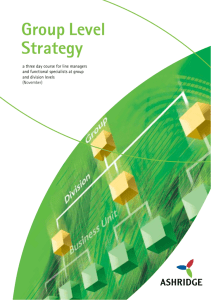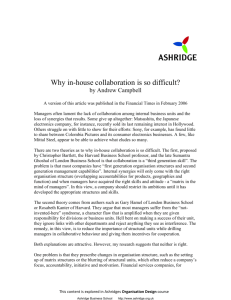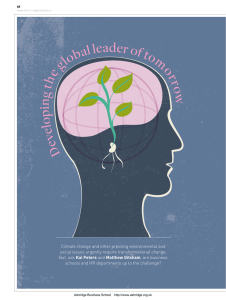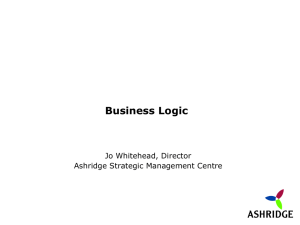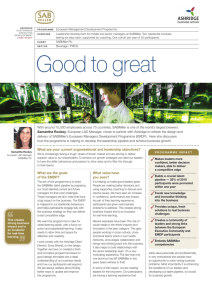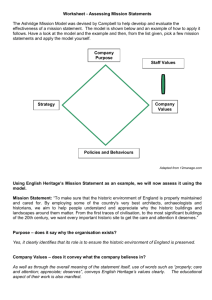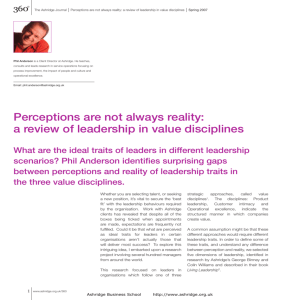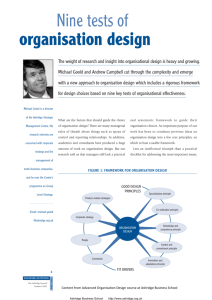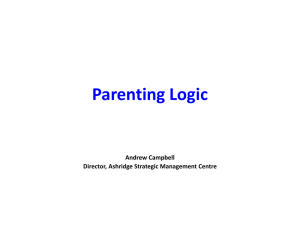Developing the Global Leader of Tomorrow
advertisement
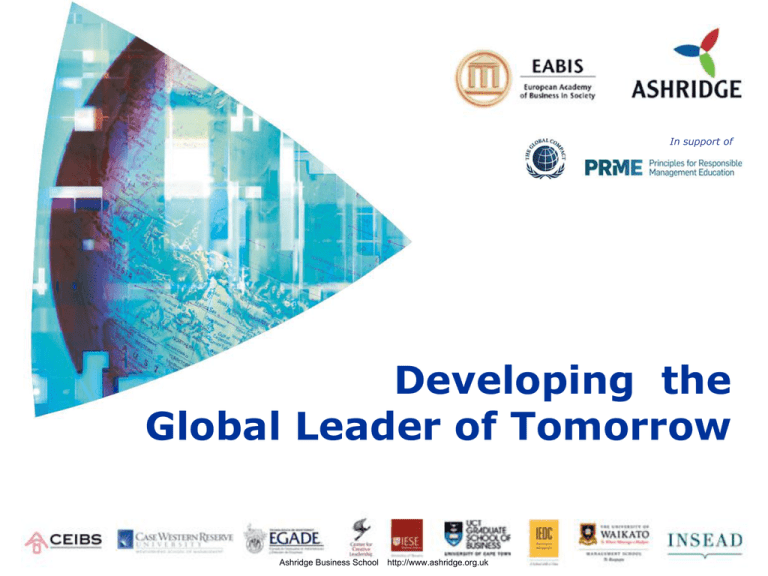
In support of Developing the Global Leader of Tomorrow Ashridge Business School http://www.ashridge.org.uk Lead Author Matthew Gitsham, Programme Director, Ashridge Business School Supporting Authors Laura Quinn, Senior Associate, Center for Creative Leadership Henri-Claude de Bettignies, Distinguished Professor of Globally Responsible Leadership, China Europe International Business School Jaime Gomez, Dean of the Graduate School of Business Administration and Leadership, EGADE, Tecnológico de Monterrey Ceri Oliver-Evans, Director, The Southern Africa-United States Centre for Leadership and Public Values, Graduate School of Business, University of Cape Town Nadya Zhexembayeva, Director, One-Year MBA Program, IEDC-Bled School of Management Joan Fontrodona, Associate Professor and Head, Business Ethics Department, Academic Director, Center for Business in Society, IESE Business School, University of Navarra Megan Pillsbury, Executive Director, INSEAD Social Innovation Centre Luc Van Wassenhove, Professor of Operations Management, The Henry Ford Chaired Professor of Manufacturing, Director, INSEAD Social Innovation Centre Juliet Roper, Associate Dean, Sustainability, Waikato Management School, University of Waikato Ante Glavas, Executive Director, Business as an Agent of World Benefit, Weatherhead School of Management, Case Western Reserve University David Cooperrider, Fairmount Minerals Professor of Social Entrepreneurship, Director Business as an Agent of World Benefit, Professor, Organizational Behavior, Weatherhead School of Management, Case Western Reserve University Ashridge Business School http://www.ashridge.org.uk Our research is based on 33 interviews and a global survey of CEOs and HR professionals at companies participating in the UN Global Compact conducted in September and October 2008. Size of organisation Managerial level Functional area Ashridge Business School Geographical region Industry sector http://www.ashridge.org.uk Key Findings • There are a host of new issues and trends in the external business environment that impact on companies, whether in terms of risks or opportunities or both. • Capabilities and culture are at least as important a part of the organisational response as policies and systems • Three distinct clusters of knowledge and skills are required by senior leaders: context, complexity and connectedness • There is a clear performance gap between the importance senior executives place on these knowledge and skills and the effectiveness with which they are currently being developed by companies, business schools and professional bodies • A broad range of different approaches to learning are required to develop these knowledge and skills • A handful of household name companies are already adopting innovative approaches to developing these knowledge and skills Ashridge Business School http://www.ashridge.org.uk There are a host of new social and environmental issues and trends in the external business environment that impact on companies, whether in terms of risks or opportunities or both. • Natural Environment • Globalisation • New pressures Please indicate the extent to which the following trends are likely to impact your organisation over the next three to five years (either by presenting risks or opportunities or both) Ashridge Business School http://www.ashridge.org.uk Capabilities and culture are at least as important a part of the organisational response as policies and systems Developing organisational capabilities (e.g. developing new knowledge and skills among senior executives, managers and employees) 28.0 33.3 Embedding consideration of these trends into strategic decision-making (e.g. entering or exiting from markets/ products lines, making acquisitions, investments, innovating to offer new products/services and production methods) 24.1 35.3 Communicating & engaging externally (e.g. building relationships with key stakeholders, building new alliances & partnerships, engaging in multistakeholder initiatives to develop joint responses, engaging with governments, public relations & communicatio 25.1 34.2 Stimulating change in organisational culture 18.8 Amending / implementing new processes and systems (eg. increasing transparency and public reporting, introducing policies and management systems for environment, human rights etc) Please indicate where the most change will be required over the next five years to enable your organisation to manage the risks and opportunities associated with social and environmental trends 15.6 Changing organisational structure 12.9 0% 5 - Substantial change Ashridge Business School 4 34.4 3 20% 2 http://www.ashridge.org.uk 21.9 25.1 8.6 12.9 25.8 30.6 40% 1 - No change 8.1 7.5 26.3 32.8 19.4 25.3 18.3 23.1 60% 80% Don't know 8.1 100% N/A CONTEXT COMPLEXITY Three distinct clusters of knowledge and skills are required by senior leaders: context, complexity and connectedness CONNECTEDNESS Context understanding and being able to respond to changes in the external environment Complexity having the skills to survive and thrive in situations of low certainty and low agreement Connectedness the ability to understand actors in the wider political landscape and to engage and build effective relationships with new kinds of external partners Ashridge Business School http://www.ashridge.org.uk Ability to factor consumer and opinion leader attitudes towards social and environmental issues into brand and new product development Understanding how other organisations in your industry sector are responding to these risks and opportunities Ability to factor into capital expenditure investment decisionmaking processes risks associated with social and environmental trends Ability to use scenario building and horizon scanning tools Understanding the implications for your organisation and your industry sector of how other actors are responding to and influencing these issues and trends Ability to factor into strategic decision-making broad social and environmental trends that transcend competitive issues within your industry sector Ability to use risk management tools Understanding corporate governance frameworks Understanding the business risks and opportunities of environmental and social trends for your organisation and your industry sector CONTEXT Awareness that there is a debate among opinion leaders about different roles business plays in society Ability to articulate the business rationale for pursuing social and environmental objectives COMPLEXITY Ability to align social and environmental objectives with financial goals Ashridge Business School http://www.ashridge.org.uk CONNECTEDNESS Ability to make decisions and manage when faced with considerable complexity and ambiguity Ability to anticipate the range of potential global implications that local level decisions might have Ability to understand the interdependency of actions and the knock-on implications of decisions CONTEXT Ability to be flexible and responsive in the face of change COMPLEXITY Ability to learn from mistakes Ability to find creative, innovative and original ways of solving problems CONNECTEDNESS Understanding that business decisions are not always driven by rational quantitative analysis, but often by feelings, emotions, values and intuition Ability to balance shorter- and longer-term considerations Understanding the ethical basis upon which business decisions are being made Ashridge Business School Understanding the limitations of a short term ‘maximising shareholder value’ approach and the rationale for managing for long term shareholder value http://www.ashridge.org.uk Understanding the business value of diversity (gender, cultural background, social networks) in enabling the organisation to have the capacity to understand, anticipate and effectively respond to change CONTEXT COMPLEXITY Ability to identify key stakeholders that have an influence on business success and/or are impacted by business activities CONNECTEDNESS Understanding the impacts of your core business activities, both positive and negative, on the wide range of stakeholders that interact with or are affected by your organisation Ability to engage in effective dialogue with a wide variety of organisational stakeholders Ability to engage and contribute to public policy Awareness of the perceptions of other people about the way you interact with others both inside and outside the organisation Ashridge Business School Ability to build effective partnerships with internal and external stakeholders Ability to translate learning from relationships with external stakeholders to situations within your organisation http://www.ashridge.org.uk • 76% of senior executives say that it is important they have the knowledge and skills to respond to trends like resource scarcity, the low carbon economy and doing business in emerging markets There is a clear performance gap How important is it that the following organisations develop these knowledge and skills over the next five years, and how effectively are they currently doing so. • Fewer than 8% believe these knowledge and skills are being developed very effectively by their own organisations or business schools. Ashridge Business School http://www.ashridge.org.uk A variety of HR levers are considered important for building these knowledge and skills Please indicate how important or not you believe the following approaches will be for helping your organisation to develop these kinds of knowledge and skills over the next five years. Developing these knowledge and skills through in-house leadership development programmes 40.1 36.9 9.1 6.4 Looking for these knowledge and skills when recruiting new talent 41.2 34.2 10.7 6.4 Incorporating these knowledge and skills into career development planning and succession planning 40.0 Incorporating these knowledge and skills into performance review, compensation and incentive systems 40.1 Incorporating these knowledge and skills into leadership competency frameworks 33.5 28.3 36.0 0% 32.3 20% Ashridge Business School 5 - Very important 4 40% 60% http://www.ashridge.org.uk 3 2 1 - Very unimportant 11.9 2.7 2.7 4.9 3.23.2 13.9 6.4 4.8 3.2 12.9 8.1 3.2 5.4 80% Don't know 100% N/A On-the-job learning 52.2 Project-based learning 37.3 Internal networks / communities of practice 34.2 34.2 360 and psychometric tools 14.2 7.1 Virtual learning / e-learning 15.1 8.6 0% 5 - Very important 4 3 2.0 http://www.ashridge.org.uk Ashridge Business School 22.3 20.1 33.3 33.0 31.0 10.4 2.7 2.7 10.31.110.3 15.2 19.5 19.7 15.8 34.2 22.2 20% 26.8 23.2 30.4 22.2 15.2 1.1 2.2 27.7 23.5 31.4 1 - Very unimportant 7.1 14.2 12.5 3.3 8.2 22.7 60% 5.42.2 8.1 3.8 18.9 31.9 40% 6.00.5 22.3 25.4 25.9 7.01.1 3.2 22.8 34.2 3.8 0.0 2.7 7.6 1.6 19.5 41.3 16.2 6.01.1 15.6 3.85.4 36.8 21.3 14.6 Lecture style learning 34.8 22.3 Service learning (learning through community service / volunteering) Please indicate which (if any) of the following approaches you believe are important elements in the learning process for developing the knowledge and skills you think are important 34.8 25.5 14.7 17.4 38.7 30.3 Simulations 16.2 3.81.6 44.6 34.4 Experiential learning A broad range of different Coaching approaches to Mentoring learning are Exposing individuals to a variety of relevant roles within the organisation required to Small group interactive style learning develop these Case studies knowledge and Appreciative inquiry skills 10.81.6 1.1 39.5 29.3 Action learning Secondments to external organisations 32.3 80% Don't know 7.61.6 8.1 2.7 100% N/A Case examples A handful of household name companies are already adopting innovative approaches to developing these knowledge and skills Ashridge Business School • Unilever • IBM • Novo Nordisk • BG Group • ABN AMRO • InterfaceFLOR http://www.ashridge.org.uk

